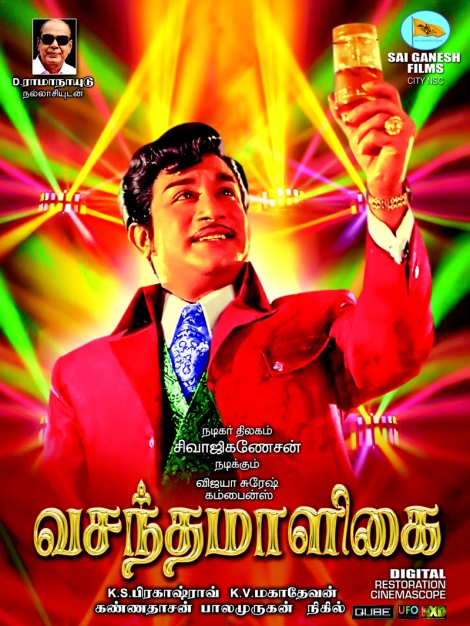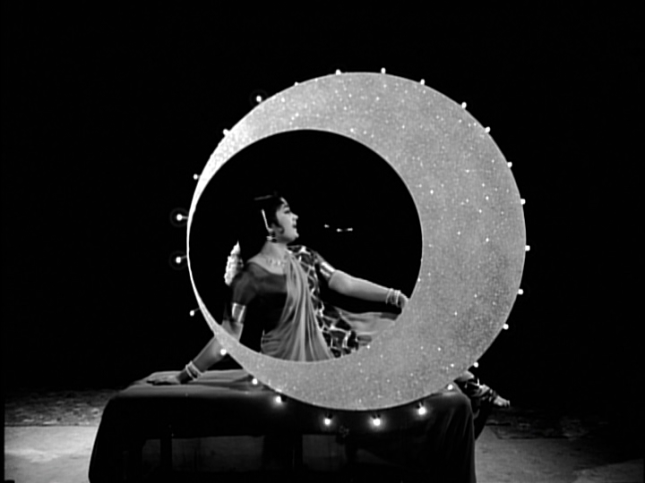
K. Raghavendra Rao’s 1979 film is a classic featuring N.T. Rama Rao and Sridevi in a mystery/romance full of stupendous seventies fashion and glorious home décor. Jandhyala’s story seems to have all the required elements but despite having 2 DVD copies of this film that say ‘with English subtitles’ neither my copies, nor the versions available on YT are subtitled, so I’m really just going with my interpretation of events. And there is a lot going on. As well as a jewellery theft, there is a murder, a feud between two rich families, some shenanigans in a tea plantation, a tribal village with a propensity for celebrating by dancing, a cosy villain’s lair and a convoluted plot to expose the criminals. N.T. Rama Rao looks a little old to be romping around the forest and fighting off the bad guys, but he does it with plenty of style while Sridevi is simply stunning as the heroine trying to find out what really happened to her mother. Apologies for the poor quality of the screencaps – in addition to no subtitles the DVD’s are of equally bad quality.
The film starts with Gayatri (Pushpalata) performing a musical interlude for her family, including her husband Ananda Bhupathi (Jaggayya) and young daughter Roja, at what seems to be a house-warming for their new palace. During her performance Gayatri wears a super-sparkly necklace which quickly attracts the attention of the palace’s steward, Sivananam (Rao Gopal Rao). Sivananam hatches a plot to steal the necklace that involves kidnapping Gayatri the next time she attends the temple. However, Gayatri manages to escape from her captors and runs into the forest where she meets Kalyana Gajapathi (Kanta Rao), a friend of the family who lives in the neighbouring palace. Kalyana Gajapathi attempts to fight the kidnappers but is killed in the struggle, while Gayatri manages to give her necklace to a local tribesman before the thugs catch up with her too.
The film moves to the present day where Ananda Bhupathi has moved back to the city after losing his wife, and the young Roja has grown up into Sridevi. Sivananam has taken over running the estate where he runs various shady businesses, including trafficking young women, with the help of his son Hari (Satyanarayana). As with all good villains, Sivananam has a lair, which judging by the fishy view, appears to be underwater and is furnished with the usual accoutrements including a handy trap door and convenient crocodile for disposing of recalcitrant girls. Hari wanders around the tea plantation, acting as a lord of the manner in his fancy suits with matching hat and flower, selecting the women he wants and disposing of them in his father’s business.
Sivananam has grand plans to marry Hari and Roja, which he puts into action when Roja visits for a hunting trip. However, he’s reckoned without Raja (N.T. Ramo Rao), the son of Kalyana Gajapathi and a hunter still living in his father’s old palace. Roja meets Raja on her way to the forest and immediately dislikes his rather sleazy approach to romance. After crashing into her car and harassing her on the train, Raja then follows the tried and true method of tormenting Roja and stalking her to make her fall in love with him, but to Roja’s credit this doesn’t seem to work. However, Raja’s heart is really in the right place and when he rescues Roja from a gang of thugs she changes her mind and the two can get down to some serious prancing.
One night Roja hears music coming from the old abandoned palace, and when Raja investigates he finds a masked man attacking a young woman in the building. Further investigation leads him to suspect something shady is going on, but it’s not until he rescues another young tribal woman and meets her father (Chalapathi Rao) that he starts to put everything together. Since he’s a man of good sense, he enlists Roja’s help with his investigations, and between them they discover the real story of what happened to Gayatri and her necklace.
Of course that’s not nearly enough drama, so added in is a feud between Ananda Bhupathi and Raja’s family as he believes Kalyana Gajapathi was behind the theft of the necklace and disappearance of his wife, resulting in his refusal to allow Roja to marry Raja. There’s also something about a little girl who was killed in a road accident, who I think was Raja’s sister, which may explain why his father was off hunting in the forest when Gayatri went missing. Or may not – I’m not clear exactly how her death fits into the rest of the story. Naturally there is a comedy track too and Nagesh and Allu Ramalingaiah ham it up between them in a feud over one of the women from the tea plantation. There is also a rather sad and toothless tiger who gets dragged into the mix and is supposedly part of the ‘comedy’, but for the most part Nagesh and Allu Ramalingaiah play well off each other even if their antics seem rather dated now.
What helps Vetagadu immensely is the mystery-based storyline and the enthusiasm and energy of the leads. Rao Gopal Rao is good as the villain of the piece with a generally benevolent air as he plots and plans his way through various schemes. Satyanarayana is also excellent as his son, with all his affectations which he drops easily once he’s involved in a fight scene. There’s a particularly good moment where he swaps shoes during an item song to pick up some diamonds and has to carry off the disruption to his perfectly matched outfit. I do like his style!
But the real stars are NTR and particularly Sridevi who manages to make her romance with the ageing superstar reasonably believable. NTR helps things along by some energetic fight sequences and a number of good dance numbers including this one in the tribal village where he imagines Roja and himself as the lead dancers.
Sridevi is simply stunning and has plenty of scope to demonstrate the full range of her acting skills Her initial comedy scenes with Raja are good, and I definitely think she gets the upper hand even though she does eventually succumb to Raja’s charms, or at least his ability to get them out of a sticky situation. Roja also gets a chance to turn detective as she partners up with Raja to find out what happened to her mother and the heirloom necklace, vamping it up and flirting with Hari as well as schmoozing up to Sivananam. She’s also gorgeous in the dance sequences and manages to carry off the various ruffles and seventies fashion (even a crocheted dress) with plenty of style. NTR does well to keep up with her, and he’s excellent in scenes where he is chasing down the answers to the puzzle of his father’s disappearance and the mystery of the missing necklace.
Although the finale, where Raja attempts a disguise to fool Sivananam and Hari doesn’t work quite as well, the rest of the story is a good mix of romance and action, just the way a masala should be. I would love to see this properly restored with English subtitles but until then, this was an enjoyable watch, even without understanding the dialogue– worth it for Sridevi, N.T. Rama Rao and Chakravarthy’s catchy dance numbers. 3½ stars.































































































